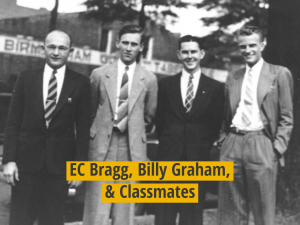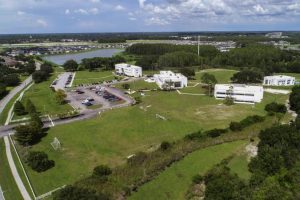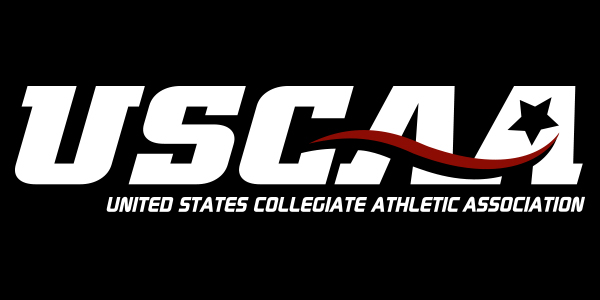Academic Catalog General Information
General Information
DOCTRINAL STATEMENT
Trinity College believes and teaches the essential doctrines of the Christian faith that are commonly held to be the historic, Biblical, conservative, and evangelical position.
- We believe the Scriptures of the Old and New Testament are verbally inspired by God, inerrant in the original writings, and that they are the supreme and final authority in faith and life.
- We believe in one God, eternally existing in three persons, Father, Son and Holy Spirit.
- We believe that Jesus Christ was conceived by the Holy Spirit and born of the virgin Mary and is fully God and fully man.
- We believe that man was created in the image of God, but that he sinned and thereby incurred not only physical death, but also spiritual death, which is separation from God.
- We believe that the Lord Jesus died for our sins according to the Scriptures as a representative and substitutionary sacrifice, and that all who believe in Him are justified on the ground of His shed blood, and adopted into God’s family as His beloved children.
- We believe in the present ministry of the Holy Spirit by whose indwelling the Christian is enabled to live a godly life, and by whom the Church is empowered to carry out Christ’s Great Commission.
- We believe in the resurrection of the crucified body of our Lord, in His ascension into heaven, and His present life there for us, as High Priest and Advocate.
- We believe in “that blessed hope,” the personal, bodily return of our Lord and Savior Jesus Christ in glory to fully establish his kingdom on the earth.
- We believe in the bodily resurrection of the just and the unjust, the everlasting bliss of the saved, and the everlasting conscious suffering of the lost.
Due to the historical convictions of the school’s Founders, and the Biblical conviction of the Faculty of the Bible and Theology Department of Trinity College of Florida. Those who teach in the Bible and Theology Department do also affirm the following statement regarding eschatology:
“We believe in that “blessed hope,” the personal, pre-millennial and imminent bodily return of our Lord and Savior Jesus Christ in glory to fully establish his kingdom on the earth.”
HISTORY
Dr. William T. Watson, a tent preacher from North Carolina, and pastor of a large Christian and Missionary Alliance church in St. Petersburg, felt the Lord leading him to establish a Bible college for the training of Christian workers. Following God’s call, he founded Florida Bible Institute in 1932, changing the name to Trinity College in 1947. Little did he realize when he started the College that a young man, Billy Graham, who would enroll in 1937 and graduate in 1940, was destined to become one of the great evangelists in the history of the church.

Though Dr. Graham is the College’s most famous graduate, he is but one of many in the past years who have gone on from the College to serve the Lord all over the world, and in many different roles. Originally focused on training pastors and missionaries, the College has expanded its course offerings over the years to include worship ministry, youth ministry, elementary education, psychology, general studies, and business organizational leadership. In 1999, the College also added an evening degree completion program for adults, enabling those with families and careers to benefit from a Trinity education.
An important characteristic of the College has always been its distinctly evangelical, but nondenominational, nature. At Trinity, students from a wide variety of church backgrounds have the opportunity to study God’s Word and be equipped to serve Him in an atmosphere of respect. In a world where nondenominational cooperation among evangelicals is becoming increasingly vital, Trinity College of Florida believes this type of education best serves its students as they prepare to live and serve more effectively.
A major milestone in the life of the College was achieved in 1996 when Trinity was accredited by the Association for Biblical Higher Education.
Accreditation demonstrates an institution’s commitment to educational quality in general, and to the Biblical and theological as well as, Christian Service requirements unique to Bible colleges. The physical size of the College was doubled with a donation of land in 2003, and an ambitious 20-year expansion plan has been adopted and is being initiated. At this important point in its development, Trinity looks with pride on its past, and with enthusiasm at its future, as we continue the tradition of equipping men and women to serve our Lord.
OUR MISSION STATEMENT
Trinity College of Florida provides a biblically-centered education, equipping servant leaders for life and career opportunities.
The goals for achieving this mission are:
- Spiritual – To orient, motivate and lead students to Christian maturity and spiritual depth.
- Academic – To engage students with opportunities to integrate Biblical faith and learning.
- Intellectual – To develop in students the ability for critical analysis and motivate in them a desire for continuing intellectual pursuits.
- Professional – To produce graduates competent in the area of their professional training.
- Social – To cultivate a culture that redefines how we learn, love, and live in a way that honors God, impacting our community for generations to come.
OUR VISION STATEMENT
The vision of Trinity College of Florida is to be the premier provider of Biblically-focused, multifaceted and diversified higher learning to fulfill the Great Commission in the life and career. Trinity College believes that the Bible should be at the heart and core of all training, and that it is the standard for evaluating all claims to knowledge. The Bible, as the inspired Word of God, is instrumental in thoroughly equipping God’s servants for ministry. This philosophy is reflected in the wide range of Bible and theology courses offered. The College believes that the Bible is the only framework within which a consistent, effective, and productive world, view, lifestyle, and life of service to God and humanity can be maintained.
STANDARDS
Trinity College is a private, Christian educational institution which has sought to create and encourage the kind of atmosphere in which quality Christian education can flourish. It is believed that the College should provide the student with precept and example from which a student can develop personal values within a Biblical framework.
In accordance with the objectives of the College, certain standards and norms have been adopted to create just such an atmosphere for the best possible educational experience.
The College expects its faculty, staff, and students to maintain personal conduct which is spiritually and morally constructive—thus glorifying the Lord in all things.
The student should understand that attendance at Trinity College is a privilege granted only to those who desire to work together in carrying out and attaining the aims of a Christian college.
When a student is accepted, an agreement is implied to be diligent in studies and employment, and to obey the Student Handbook regulations. The administration reserves the right to withdraw anyone who is considered to be out of harmony with the spirit of the College. It is expected that the conduct of each student will give evidence of Christian standards of honesty, morality, and courtesy.
The policy of the College in promoting spiritual growth and the pursuit of learning is best summed up in these words: Be diligent to present yourself approved to God as a workman who does not need to be ashamed, accurately handling the word of truth. (2 Timothy 2:15, NASB)
Although the Trustees and Administration of Trinity College of Florida in no way guarantee employment to any of its graduates, they believe that the application of Biblical principles in the lives of faculty and the students will result in personal love and commitment to Christ, wholesome consideration for others, and a well-disciplined life.
STUDENT BODY
Geographical Distribution
Eight states and four foreign countries were represented on campus in the Fall of 2023-2024 semester with 93% of students coming from Florida.
Church Affiliation
Trinity College is a nondenominational, evangelical Bible college, and in the last academic year more than 10 denominations or independent churches were represented, or attended, by students on campus.
Campus
The campus of Trinity College is located in Trinity, just north of Tampa and near the Gulf of Mexico. It is in the heart of a rapidly expanding new area of Pasco County, the Trinity Communities, which contains its own medical facility, YMCA, and other facilities. It is convenient to several shopping areas, and its location provides easy access to many of Florida’s tourist areas and Gulf fishing and boating.

Residence Halls
The L.L. Speer Hall serves as the main residence hall for the campus. The three-story residence building is equipped with the latest and safest technology. The Ruth Munce Hall is used as an additional residence hall for the campus.
W.T. Watson Administration Building
The W.T. Watson Administration Building currently houses the student lounge, kitchen, dining room, administrative offices, faculty offices, and classrooms, along with the central maintenance facility.
Disclaimer
Trinity College of Florida reserves the right to make any changes in the programs presented, tuition and fees, and the courses offered in this publication. The provisions of this catalog are subject to change without notice and do not constitute an irrevocable contract between any student and the College. All addendums will be posted on the Trinity College website, once approved.



